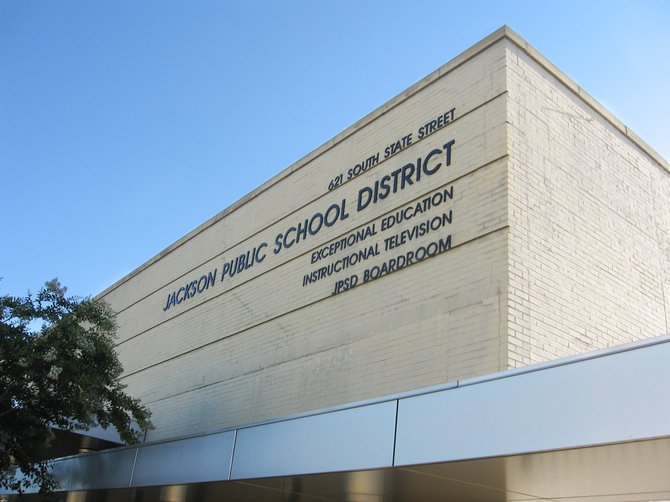Because the program focused mainly on senior (12th grade) students, senior teachers were greatly affected. Photo by Elizabeth Waibel.
While sitting in the Mississippi Coliseum on May 28, a terrible feeling came over Sarah Phillips, then a third-year Algebra I teacher, who was attending Forest Hill High School's graduation ceremony.
"When I went to graduation, I (could) count a handful -- at least -- of students that have no business graduating," Phillips said.
Phillips was upset about the school's credit-recovery program, which allows students to earn course credit after receiving a failing grade in a class. She said she started hearing from teachers that students were being allowed to go into the school's computer lab, log on to a special software program and make up for a year's worth of coursework.
"So, you fail government, or you fail chemistry, or you fail something that is required, you're not going to graduate, right? Well, these kids are being allowed to go into a computer lab and (after) maybe one or two days of what is called 'credit recovery,' then have credit for the class for an entire year," Phillips said.
'He's Not Going to Pass'
This does not sit well with Phillips, and she said other Forest Hill teachers were upset as well because students who did not attend class and did not perform well in class graduated.
She gave as an example a student who was not attending class and received multiple disciplinary actions such as suspension, but who was allow to graduate. "The whole year we were like, 'He's not going to pass,' and he did. He walked. He graduated because of credit recovery," she said. "He's a smart kid. I'm sure he got something out of the credit recovery, but where do you draw the line in saying in saying, 'you can make up this class in two days?'"
A science teacher also told Phillips of another student who used credit recovery. "A student attended her class two days the entire year and went to credit recovery for two days and got that science credit to graduate," Phillips said. The teacher told Phillips the student completed credit recovery in two days with a 40 percent overall grade.
Phillips said she has not experienced course recovery before this year. "To my knowledge, I know for a fact that many of the other teachers in the building were extremely surprised. They didn't understand what's happening, and how all of the sudden these kids who failed them—like, rocked a 20 (percent) all year—were graduating," she said.
Because the program focused mainly on senior (12th grade) students, senior teachers were greatly affected.
"It seemed to me from the senior teachers I interacted with that they were all fairly incredulous like didn't see it coming by a mile," she said.
Not a New Practice
Freddrick Murray, executive director of Jackson Public Schools' high school division, said credit recovery has been around for years, but the district started using a new program called Odysseyware at the end of the year.
At its Feb. 4 meeting, the Jackson Public Schools board of trustees unanimously approved Odysseyware for student use.
Murray said Odysseyware is a web- and research-based program that students can complete when they have failed a course or skill. Students take a diagnostic test to assess what needs to be addressed in the program and can work on the program wherever they have Internet access. But students must take all assessments at school while being monitored.
"What the student can recover depends on the student. It could take the student days, or it could take the student weeks to recover credit," he said. "So it's not unusual to recover credit quickly. It just depends on how hard they work."
Murray said the program definitely affects graduation rates, and that was the reason JPS purchased the program. He said it gives students an opportunity to be successful.
"We have students that are over-aged (for high school), and sometimes you'll find that over-aged students have hopelessness," Murray said. "They end up making the decision to drop out because they don't see an end-goal. They don't think they can make it to graduation."
Although its goal is to increase graduation rates, some teachers do not believe students benefit from the program.
Another Forest Hill teacher, who asked that her name not be used, taught in JPS for two-and-a-half years before moving on to another Mississippi school district. She said some of her senior students took credit recovery within a week of each other. One student completed the program in only three hours. She said the teachers do not control who can take the program and cannot see the assignments.
"Everybody hates it. It is ridiculous that our kids can just take this class in three hours," she said. "Because the graduation rate is so important, it's skyrocketed use. We probably had 80-plus kids in credit recovery the last week."
Phillips has seen students work on the program and thinks it is ridiculous. "It's one thing to say they can go in and do it in two days," she said. "The other part of it, though, is that the program is ridiculous. It is not worth anything."
Neither is the diploma they receive, said Phillips, who has left the district.
"(A student) has literally walked out of that building with nothing but a piece of paper that is now, in my opinion, much devalued," Phillips said. "Is this the new normal?"
'No One Is Going to Read It'
Because students must take assessments at school to be monitored, Murray said two people have been trained at each site including a school administrator and an interventionist—the person who works and monitors the program.
One day, Phillips took her students into the computer lab, and a lot of seniors were trying to recover credit. She saw a student who had both a credit recovery page and a Wikipedia page open on her window. Phillips said she watched the student type word for word from the Wikipedia page.
"I asked the supervisor of the room, 'What is she doing?' And she told me that she was doing credit recovery on that program. I was like, 'OK. You realize she's just typing, right?'" she said. "The supervisor just shrugged her shoulders and said (something) like 'no one is going to read it anyway.' That was the reaction of the person supervising this program. You can imagine that's what's going on with credit recovery."
Destroying Teacher Morale
Sherwin Johnson, Jackson Public Schools' executive director of public and media relations, said the Mississippi Department of Education approved the district's credit-recovery program.
"JPS is not using any tool that is not approved and used in other school districts," he said.
Patrice Guilfoyle, communication director of the Mississippi Department of Education, said each district establishes a policy, and MDE checks the policy and student records during the accreditation process.
The program in also use in the Pontotoc, Bay St. Louis-Waveland, Louisville and Covington County school districts.
A state board policy states: "Credit recovery is defined as a course-specific, skill-based learning opportunity for students who have previously been unsuccessful in mastering content/skills required to receive course credit or earn promotion," and "Students shall not remain in a Credit Recovery Course for more than one year."
Although JPS claims its course-recovery program is following MDE and district policies, the program could greatly affect student education as well as teacher morale.
"People who were already underpaid and under-appreciated are now like, 'Why am I here?'" Phillips said.
The former Forest Hill teacher agrees. "It's awful. There's no point in the teachers. It's the worse thing that could happen in the state," she said. "It destroys teacher morale. It makes us not understand why we're doing it."
Murray said there should be no concern about abusing the credit-recovery program because it is used across the country. School districts in at least 28 states are using the software.
"I venture to say that every district has some kind of credit-recovery tool," Murray said. "It is something that might be different to some teachers, but again it is a tool for helping our students recover credit so they can graduate on time so they can have be successful in school."
He said JPS has not heard any more complaints about the program than any other initiative. They have actually heard positive feedback.
"There are new teachers in the district, and there are teachers who have not been involved in credit recovery in the past. It is a new initiative with Odyssey that we are training, and we just really started implementation of it," Murray said. "With that, as we train more, people will understand what credit recovery actually is."
But Phillips disagrees.
"It's not being implemented the way that it should be if it's going to be anything worthwhile for the kids. They're getting zero knowledge out if it. They're not learning any sort of skill about working hard or earning something," she said.



